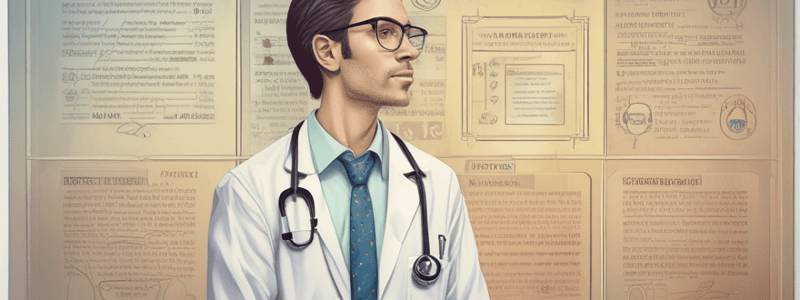Podcast
Questions and Answers
Under HIPAA, which of the following is considered Personal Health Information (PHI)?
Under HIPAA, which of the following is considered Personal Health Information (PHI)?
- Social security numbers (correct)
- Bank account details
- Favorite color
- Employment history
What consequence can a covered entity face for disclosing PHI without patient authorization under HIPAA?
What consequence can a covered entity face for disclosing PHI without patient authorization under HIPAA?
- Monetary fine (correct)
- Tax exemption
- Verbal warning
- Public recognition
What is the purpose of the Notice of Privacy Practices (NPP) that practices provide to patients under HIPAA?
What is the purpose of the Notice of Privacy Practices (NPP) that practices provide to patients under HIPAA?
- Outlining possible menu items
- Detailing uses of PHI and patient rights (correct)
- Billing information
- Scheduling appointments
Which specific safeguard is mandated by the HIPAA Security Rule to secure medical information?
Which specific safeguard is mandated by the HIPAA Security Rule to secure medical information?
What entity enforces compliance with HIPAA regulations and can impose penalties for violations?
What entity enforces compliance with HIPAA regulations and can impose penalties for violations?
Flashcards are hidden until you start studying
Study Notes
- PIPA stands for the Health Insurance Portability and Accountability Act, originally designed to protect individuals from losing health insurance when changing jobs or having pre-existing conditions.
- HIPAA has expanded to reduce healthcare transaction costs, develop standards for protecting personal health information, and ensure patient confidentiality.
- Personal health information (PHI) includes patient health records, lab results, medical history, and sensitive data like social security numbers, requiring security measures.
- Covered entities under HIPAA cannot disclose PHI without patient authorization, except for specific purposes like treatment, payment, or healthcare operations.
- Practices must provide patients with a Notice of Privacy Practices (NPP) outlining uses of PHI, patient rights, and access to medical information.
- HIPAA Security Rule mandates administrative, physical, and technical safeguards to secure medical information, including policies, training, access controls, encryption, and contingency planning.
- Violating HIPAA can lead to penalties up to $50,000 per violation, increasing to $1.5 million per identical penalty or willful neglect in a calendar year, enforced by the Office of Civil Rights.
Studying That Suits You
Use AI to generate personalized quizzes and flashcards to suit your learning preferences.




